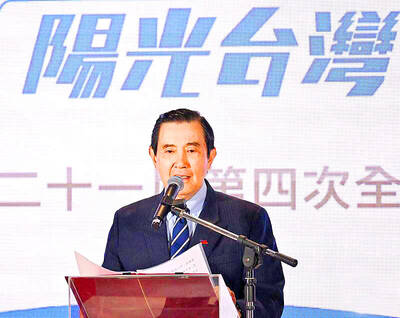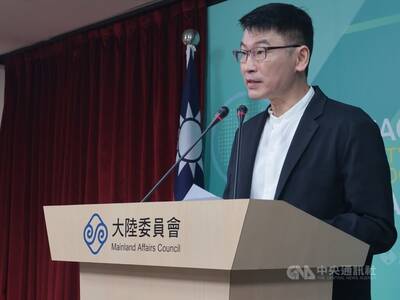Landline use in Taiwan has fallen dramatically over the past decade, with people’s use of the traditional voice service averaging less than seven minutes a day, National Communications Commission (NCC) data showed.
The decline in talking minutes corresponds with a similar drop in the number of landline owners, given the prevalance of smartphones and third-party messaging apps.
From 2011 to January this year, the number of landlines fell from 12.68 million to 10.27 million, with businesses accounting for 27 percent.

Photo: Ting Yi, Taipei Times
Use of international call services also plummeted from 4.94 billion minutes in 2011 to only about 220 million last year, representing a mere 5 percent of the 2011 figure.
However, the rapid decline in landline use seems to be leveling off, with an NCC report indicating that more than 90 percent of landline users last year said they have no plans to dispose of the service within the next year.
Those who have chosen to cancel it mainly cite replacing it with a cellphone and not needing to make telephone calls as reasons, the report said.
Landline usage differs greatly by age and location, with older people and people living in remote areas relying more on the fixed-line service, NCC data showed.
Compared with the national average of 45 talking minutes per week, users in Yilan, Hualien, Taitung, Pingtung and Penghu counties, as well as Kaohsiung, all average longer than an hour.
While only 7.8 percent of people use landlines, among those aged 66 and older, the figure is 26.4 percent.
Chunghwa Telecom is keeping an eye on the decline in landline usage precipitated by the prevalence of cellphones, said Su Tian-cai (蘇添財), president of the telecom’s consumer business group.
However, there are some unique benefits to landlines, namely their independence from the power grid and location data for emergency services, he said.
Whether landline service should be canceled would be decided by market mechanisms, NCC Vice Chairman Wong Po-tsung (翁柏宗) said on Sunday.
The NCC would not get involved, either by encouraging its use or phasing it out, he added.
Landlines boost the resilience of the overall communications network, enabling communication in the event of a power outage or disaster, he said.
Telecom experts expect landlines to continue in service in Taiwan for a while longer.
The years after 2013 saw a huge dip in telephone use as cellphone and Internet services matured, said Hsiao Yi-ching (蕭怡靖), a professor at Tamkang University’s Department of Public Administration.
However, now that the communications environment has stabilized, the cancelation of landlines has also leveled off, he said.
Considering that businesses would continue to need landlines, as well as their lower price, there is still a sizeable contingent of people who prefer keeping their contracts, Hsiao added.

‘ANGRY’: Forgetting the humiliations and sacrifices of ‘the people of the Republic of China’ experienced disqualified Lai from being president, Ma Ying-jeou said Former president Ma Ying-jeou (馬英九) yesterday criticized President William Lai (賴清德) over what he called “phrasing that downplayed Japan’s atrocities” against China during World War II. Ma made the remarks in a post on Facebook on the 80th anniversary of the end of World War II. Ma said he was “angry and disappointed” that Lai described the anniversary as the end of World War II instead of a “victory in the war of resistance” — a reference to the end of the Second Sino-Japanese War (1937-1945). The eight-year war was a part of World War II, in which Japan and the other Axis

The Mainland Affairs Council (MAC) yesterday announced a ban on all current and former government officials from traveling to China to attend a military parade on Sept. 3, which Beijing is to hold to mark the 80th anniversary of the end of the Second Sino-Japanese War. "This year marks the 80th anniversary of the end of World War II and the Republic of China’s victory in the War of Resistance [Against Japan]," MAC Deputy Minister and spokesperson Liang Wen-chieh (梁文傑) told a regular news briefing in Taipei. To prevent Beijing from using the Sept. 3 military parade and related events for "united

‘OFFSHORE OPERATIONS’: Also in Dallas, Texas, the Ministry of Economic Affairs inaugurated its third Taiwan Trade and Investment Center to foster closer cooperation The 2025 Taiwan Expo USA opened on Thursday in Dallas, Texas, featuring 150 Taiwanese companies showcasing their latest technologies in the fields of drones, smart manufacturing and healthcare. The Taiwan External Trade Development Council (TAITRA), the event’s organizer, said the exhibitors this year include Hon Hai Precision Industry Co (Foxconn), the world’s largest contract electronics manufacturer; AUO; PC brand Asustek Computer; and drone maker Thunder Tiger. In his opening speech, TAITRA chairman James Huang (黃志芳) said he expected Texas to become a world-class center for innovation and manufacturing as US technology companies from Silicon Valley and Taiwanese manufacturers form an industrial cluster

A 20-year-old man yesterday evening was electrocuted and fell to his death after he climbed a seven-story-high electricity tower to photograph the sunset, causing a wildfire on Datong Mountain (大同山) in New Taipei City’s Shulin District (樹林), the Taoyuan Police Department said today. The man, surnamed Hsieh (謝), was accompanied on an evening walk by a 20-year-old woman surnamed Shang (尚) who remained on the ground and witnessed the incident, capturing a final photograph of her friend sitting atop the tower before his death, an initial investigation showed. Shang then sought higher ground to call for help, police said. The New Taipei